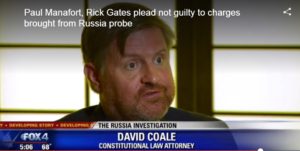 After the commercial, at about 2:30 in this news segment, I offer a couple of thoughts about recent developments in the Russia investigation.
After the commercial, at about 2:30 in this news segment, I offer a couple of thoughts about recent developments in the Russia investigation.
Category Archives: Uncategorized
 Today this blog celebrates its 6th birthday! Thank you for reading. And if you want to help celebrate, consider mixing up some Crabmeat Yvonne, a staple of New Orleans’s great Galatoire’s.
Today this blog celebrates its 6th birthday! Thank you for reading. And if you want to help celebrate, consider mixing up some Crabmeat Yvonne, a staple of New Orleans’s great Galatoire’s.
Five Tips for Hurricane Harvey Litigation (a version of this article is in this week’s Texas Lawbook)
In the course of reviewing the Fifth Circuit’s commercial cases for this blog, I have read many opinons about disputes arising from Hurricane Katrina cases. In light of the havoc recently created by Hurricane Harvey, I wanted to share five observations to prepare for the litigation that will inevitably result.
- Record the facts.
Any lawsuit creates tension between the past and the future. The parties want to move on, and put the expense and stress of litigation behind them. But the legal case forces them to revisit the past.
That tension is particularly acute after a disaster such as Harvey, which forced people and businesses to endure incredible stress, while making them then revisit that trauma to protect their legal rights in court. The – entirely understandable – desire to move on, must be squared with the need to take the time to preserve evidence.
Consider St. Bernard Parish v. Lafarge North America, a case about the destruction of a bridge during Hurricane Katrina. While the parties offered extensive expert testimony about what caused the damage, the summary judgment proceedings turned in no small part on the facts of what happened during the storm, including facts established by photographs.
A party facing litigation should consider – as awkward as it can be while recovering from a life-disrupting event – what facts seem obvious now but may fade from memory as time goes on. To the extent possible, some thought should be given to:
- maintaining electronic records, even if the hardware appears damaged at first blush;
- writing down a “log” of relevant conversations and events about important events;
- storing any relevant physical objects, for potential future analysis by experts; and
- simply writing down basic information about names, addresses, phone numbers, and the like.
In a case arising from a natural disaster, courts will likely be forgiving as to claims of spoliation. But lost information is lost, and its absence can later effect the resolution of a legal case.
- Help the people.
The fact evidence in the Lafarge case also included eyewitness testimony, which proved critical to defeating the defendant’s summary judgment motion. Just as a photograph can deteriorate, a person’s memory can fade. And the likelihood of that occurring can only increase when the person is placed under the severe stress of a natural disaster.
Any “team” confronted with a legal challenge by Harvey – a business, a professional organization, or even a family – should be mindful of the psychological effects of that stress, and encourage counseling for depression, substance abuse, and other such problems when their first signs appear. Of course, that is a good practice in any event. But its potential side benefit to a legal case is real and worth remembering.
- Remember three definitions.
The factual and legal issues that will ultimately go to trial in cases about Harvey simply cannot be predicted with any specificity. But in the short run, three basic legal concepts are likely to pervade business dealings related to the storm:
- The Texas pattern jury instruction about “duress” defines it as “the mental, physical, or economic coercion of another, causing that party to act contrary to his free will and interest.”
- While “force majeure” is ordinarily defined by a specific contract, it generally refers to an “extraordinary event or circumstance beyond the control of the parties,” and often does not excuse a party’s non-performance entirely, but only suspends it for the duration of the event.
- “Impossibility of performance” is defined by the Restatement (Second) of Contracts as occurring “[w]here, after a contract is made, a party’s performance is made impracticable without his fault by the occurrence of an event the non-occurrence of which was a basic assumption on which the contract was made, his duty to render that performance is discharged, unless the language or the circumstances indicate the contrary.”
Awareness of these concepts can potentially avoid problems down the road, as well as identify topics and issues that require special attention today.
- “Two-deep leadership.”
The Boy Scouts of America strictly follows a policy of “two-deep leadership,” under which two adults should be present at all times when interacting with youth. One benefit of that policy is to avoid “he-said, she-said” disputes between two eyewitnesses with no third–party corroboration. In the stress of dealing with the aftermath of Harvey, involving a business colleague or a friend in important discussions may help the future resolution of a legal matter, if a dispute arises about what was said in those discussions.
- Crowdsource, wisely.
For good or ill, social media has come a long way since Hurricane Katrina. Used judiciously, it can be a good source of information about late-breaking news or the reputation of a particular business. And it can provide a valuable outlet for self-expression after the trauma of Harvey.
But social media posts can survive much longer than the thoughts that prompted them, and rash comments about people or events can come back to haunt the person who makes an ill-advised post. Social media is a valuable conduit for information, and at the same time, it is a reliable creator and collector of potential evidence.
Conclusion
Faced with the reality of recovery from one of the worst storms in the nation’s history, planning for future litigation may seem to be a distant worry. But the foundation for that litigation is being put in place today, intentionally or unintentionally. These five basic ideas may provide ways to place that foundation in a more orderly manner, resulting in a stronger end product.
 Yahoo cancelled its contract with SCA related to a billion-dollar “perfect bracket contest” for 2014’s March Madness. The parties disputed the appropriate termination payment, defined in the contract as “50% of the fee” – Yahoo contending the “fee” was 50% of the $1.1 million deposit that it already paid SCA; SCA contending that the “fee” was the rull $11 million contract fee, credited for the deposit. The Fifth Circuit reversed and rendered judgment for SCA, noting that the contract “clear[ly] incorporated by reference two invoices that specified the $11 million figure,” and identifying several other contract provisions consistent with SCA’s reading. The issue of what documents comprise a contract, and the related legal issue of when a court may consider “parol” evidence, continues to be a frequent – if not the most frequent – point of disagreement between the Fifth Circuit and trial courts. SCA Promotions v. Yahoo!, No. 15-11254 (Aug. 21, 2017).
Yahoo cancelled its contract with SCA related to a billion-dollar “perfect bracket contest” for 2014’s March Madness. The parties disputed the appropriate termination payment, defined in the contract as “50% of the fee” – Yahoo contending the “fee” was 50% of the $1.1 million deposit that it already paid SCA; SCA contending that the “fee” was the rull $11 million contract fee, credited for the deposit. The Fifth Circuit reversed and rendered judgment for SCA, noting that the contract “clear[ly] incorporated by reference two invoices that specified the $11 million figure,” and identifying several other contract provisions consistent with SCA’s reading. The issue of what documents comprise a contract, and the related legal issue of when a court may consider “parol” evidence, continues to be a frequent – if not the most frequent – point of disagreement between the Fifth Circuit and trial courts. SCA Promotions v. Yahoo!, No. 15-11254 (Aug. 21, 2017).
I was interviewed today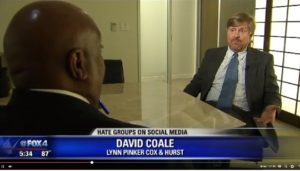 by Fox 4 Dallas about social media and hate speech, in light of recent events in Charlottesville.
by Fox 4 Dallas about social media and hate speech, in light of recent events in Charlottesville.
Five LPCH attorneys are on 2018’s list of Best Lawyers in America!
 I recently participated in a mock reargument of Marbury v. Madison (right), albeit changed from the original to (1) actually have discussion about judicial review (2) actually have participation by my character, Attorney General Levi Lincoln, who in “real life” was ordered to stay silent by a highly irritated President Jefferson. In case you should ever need such a thing, here are my notes about the case against judicial review, which rely heavily upon an outstanding 1969 Duke Law Journal article by Professor William Van Alstyne.
I recently participated in a mock reargument of Marbury v. Madison (right), albeit changed from the original to (1) actually have discussion about judicial review (2) actually have participation by my character, Attorney General Levi Lincoln, who in “real life” was ordered to stay silent by a highly irritated President Jefferson. In case you should ever need such a thing, here are my notes about the case against judicial review, which rely heavily upon an outstanding 1969 Duke Law Journal article by Professor William Van Alstyne.
 The Fifth Circuit website has recently posted an “Important Note Regarding FRAP 28(j) Filings,” which reminds: “Counsel sometimes file a FRAP 28(j) letter after oral argument, ostensibly to provide information requested by the court, but make supplemental argument in the filing. . . . [U]nless authorized or requested by the panel, it is improper to make supplemental argument in the letter.”
The Fifth Circuit website has recently posted an “Important Note Regarding FRAP 28(j) Filings,” which reminds: “Counsel sometimes file a FRAP 28(j) letter after oral argument, ostensibly to provide information requested by the court, but make supplemental argument in the filing. . . . [U]nless authorized or requested by the panel, it is improper to make supplemental argument in the letter.”
While this story does not involve federal practice, the recent death of former Dallas Court of Appeals Justice David Lewis, who resigned from that Court last year to combat alcoholism and depression, sounds a warning note for all in the legal profession about the importance of mental health.
 Green Tree Servicing, LLC v. Clayton involved an unusual argument about the “first-to-file rule, in the context of two actions pending before the same district judge. The Fifth Circuit observed: “[T]he concerns undergirding the firstto-file rule are not triggered when the cases are before the same judge. The first-to-file rule is aimed at avoiding both conflicting rulings on similar issues and duplicative rulings. But when the same judge is deciding both cases, there is no danger of conflicting rulings.” No. 16-60726 (May 18, 2017, unpublished).
Green Tree Servicing, LLC v. Clayton involved an unusual argument about the “first-to-file rule, in the context of two actions pending before the same district judge. The Fifth Circuit observed: “[T]he concerns undergirding the firstto-file rule are not triggered when the cases are before the same judge. The first-to-file rule is aimed at avoiding both conflicting rulings on similar issues and duplicative rulings. But when the same judge is deciding both cases, there is no danger of conflicting rulings.” No. 16-60726 (May 18, 2017, unpublished).
 “[W]here a plaintiff seeks to rely on epidemiological evidence, Texas law requires that the stifues show a statistically significant doubling of the risk of developing their alleged inuiries. . . . The studies relied on by the Plaintiffs and their experts do not . . . One of these studies did not quantify the risk of developing Plaintiffs’ chromuim-related-acute-irritation injuries at all and the other study did not find a doubling of the risk.” McManaway v. KBR, Inc., No. 15-20641 (March 27, 2017) (applying Merck & Co. v. Garza, 347 S.W.3d 256 (Tex. 2011)).
“[W]here a plaintiff seeks to rely on epidemiological evidence, Texas law requires that the stifues show a statistically significant doubling of the risk of developing their alleged inuiries. . . . The studies relied on by the Plaintiffs and their experts do not . . . One of these studies did not quantify the risk of developing Plaintiffs’ chromuim-related-acute-irritation injuries at all and the other study did not find a doubling of the risk.” McManaway v. KBR, Inc., No. 15-20641 (March 27, 2017) (applying Merck & Co. v. Garza, 347 S.W.3d 256 (Tex. 2011)).
 Air Evac contended that the Airline Deregulation Act preempted Texas workers compensation laws about reimbursement for air-ambulance services. This claim led to a dispute about the scope of Eleventh Amendment liability and the landmark Constitutional case of Ex parte Young, 209 U.S. 123 (1908). In a methodical analysis of Young’s history and purpose, the Fifth Circuit concluded that Air Evac could sue: “[T]he balance-billing prohibition works in concert with state defendants’ implementation of the reimbursement system, serving as a backstop against alternative methods of fee collection. State defendants’ pervasive authority to oversee and enforce Texas’ workers’-compensation system satisfies the Ex parte Young exception.” Air Evac EMS, Inc. v. State of Texas, No. 16-51023 (March 20, 2017).
Air Evac contended that the Airline Deregulation Act preempted Texas workers compensation laws about reimbursement for air-ambulance services. This claim led to a dispute about the scope of Eleventh Amendment liability and the landmark Constitutional case of Ex parte Young, 209 U.S. 123 (1908). In a methodical analysis of Young’s history and purpose, the Fifth Circuit concluded that Air Evac could sue: “[T]he balance-billing prohibition works in concert with state defendants’ implementation of the reimbursement system, serving as a backstop against alternative methods of fee collection. State defendants’ pervasive authority to oversee and enforce Texas’ workers’-compensation system satisfies the Ex parte Young exception.” Air Evac EMS, Inc. v. State of Texas, No. 16-51023 (March 20, 2017).
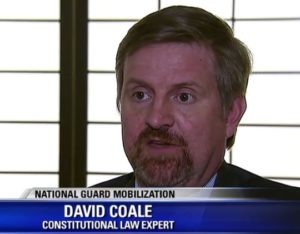 I commented today on Dallas’s Fox 4 News about how the potential deployment of the National Guard about illegal immigration could implicate the Posse Comitatus Act.
I commented today on Dallas’s Fox 4 News about how the potential deployment of the National Guard about illegal immigration could implicate the Posse Comitatus Act.
Just before filing for bankruptcy, Mr. Wiggins signed a “Partition Agreement” in which he and his wife divided their ownership of their home into two separate property interests. The Fifth Circuit affirmed the bankruptcy court’s conclusion that this was a fraudulent transfer: “When it became clear that Mr. Wiggains would file bankruptcy to satisfy his outstanding debts, the couple entertained various options and made their best estimate on ultimate financial benefits by having only Mr. Wiggains file after the Partition Agreement was recorded. Allowing Mrs. Wiggains to sidestep the statutory limits for homestead exemptions and obtain approximately $500,000 in proceeds that otherwise are for creditors would lay waste to the provisions of the Bankruptcy Code involved here.” Wiggains v. Reed, No. 15-11249 (Feb. 14, 2017).
 A group of real estate companies paid Prime LLC for consulting services. While the contract allowed termination with 60 days notice, the group and Prime agreed to end the contract without using the notice provision. A creditor complained that this termination made a fraudulent transfer, and the Fifth Circuit agreed that the claim was at least facially plausible: “While the value of the notice period lost by failure to adhere to the notice provision remains an issue for further development in the district court, at this stage
A group of real estate companies paid Prime LLC for consulting services. While the contract allowed termination with 60 days notice, the group and Prime agreed to end the contract without using the notice provision. A creditor complained that this termination made a fraudulent transfer, and the Fifth Circuit agreed that the claim was at least facially plausible: “While the value of the notice period lost by failure to adhere to the notice provision remains an issue for further development in the district court, at this stage  we think the notice requirement secured measurable economic benefit to Prime. Assuming the facts alleged surrounding this transaction to be true, as we must under Rule 12(b)(6), Plaintiff has alleged an asset, cognizable as such under TUFTA, that was constructively transferred.” Hometown 2006-1 1925 Valley View LLC v. Prime Income Asset Management LLC, No. 15-10881 (Feb. 2, 2017)
we think the notice requirement secured measurable economic benefit to Prime. Assuming the facts alleged surrounding this transaction to be true, as we must under Rule 12(b)(6), Plaintiff has alleged an asset, cognizable as such under TUFTA, that was constructively transferred.” Hometown 2006-1 1925 Valley View LLC v. Prime Income Asset Management LLC, No. 15-10881 (Feb. 2, 2017)
Several u npublished opinions from the Fifth Circuit in recent weeks, most recently Smitherman v. Bayview Loan Servicing LLC, No. 16-20328 (Jan. 11, 2017, unpublished), have ordered limited remands to the district court “to permit supplementation of the record and to make findings regarding . . . citizenship.” Once completed, “the district court’s amended opinion shall return” to the panel “for appropriate action.” It appears that the Court is reviewing case files not only to confirm appellate jurisdiction, but also the necessary facts to support federal subject matter jurisdiction as well.
npublished opinions from the Fifth Circuit in recent weeks, most recently Smitherman v. Bayview Loan Servicing LLC, No. 16-20328 (Jan. 11, 2017, unpublished), have ordered limited remands to the district court “to permit supplementation of the record and to make findings regarding . . . citizenship.” Once completed, “the district court’s amended opinion shall return” to the panel “for appropriate action.” It appears that the Court is reviewing case files not only to confirm appellate jurisdiction, but also the necessary facts to support federal subject matter jurisdiction as well.
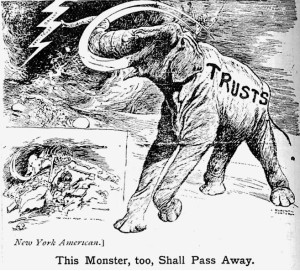 After the recent opinion of Retractable Technologies v. Becton Dickinson Co., followers of the Fifth Circuit’s antitrust cases should also note that on October 31, the Supreme Court declined to review MM Steel v. JSW Steel, 806 F.3d 835 (5th Cir. 2015).
After the recent opinion of Retractable Technologies v. Becton Dickinson Co., followers of the Fifth Circuit’s antitrust cases should also note that on October 31, the Supreme Court declined to review MM Steel v. JSW Steel, 806 F.3d 835 (5th Cir. 2015).
 I was on the trial team that won a $146 million verdict in Pecos, Texas last week;here is the Dallas Morning News’s recent story on the case.
I was on the trial team that won a $146 million verdict in Pecos, Texas last week;here is the Dallas Morning News’s recent story on the case.
 In Marshall v. Hunter, a removed action, the Fifth Circuit addressed a notice of appeal from a state court ruling made before ruling about personal jurisdiction. The Court declined to hear the appeal, saying: “while state court orders and rulings remain in effect upon removal, they do not become appealable orders of the district court until the district court adopts them as its own.” No. 16-20646 (Oct. 20, 2016, unpublished).
In Marshall v. Hunter, a removed action, the Fifth Circuit addressed a notice of appeal from a state court ruling made before ruling about personal jurisdiction. The Court declined to hear the appeal, saying: “while state court orders and rulings remain in effect upon removal, they do not become appealable orders of the district court until the district court adopts them as its own.” No. 16-20646 (Oct. 20, 2016, unpublished).
 What better way to celebrate 600Camp.com’s fifth birthday than with Emeril’s muffaletta recipe? Thanks to all blog readers for years of support and encouragement.
What better way to celebrate 600Camp.com’s fifth birthday than with Emeril’s muffaletta recipe? Thanks to all blog readers for years of support and encouragement.
 In Wilson v. Navika Capital Group LLC, the appellants filed this notice of appeal from adverse rulings in an FLSA dispute. The Fifth Circuit found that the reference in the notice to “Plaintiffs Wilson et al.” did not satisfy the requirements of Fed. R. Civ. P. 3 in light of the entire record — a case in which “the plaintiffs .. were in ‘continual flux’ at the district court, as various groups of plaintiffs were dismissed at different times.” The notice was sufficient as to two plaintiffs specifically named in named in the style of the case as shown on the notice, as Rule 3 says — “The notice of appeal must: specify the party or parties taking the appeal by naming each one in the caption or body of the notice.” No. 15-20204 (Aug. 8, 2016, unpublished).
In Wilson v. Navika Capital Group LLC, the appellants filed this notice of appeal from adverse rulings in an FLSA dispute. The Fifth Circuit found that the reference in the notice to “Plaintiffs Wilson et al.” did not satisfy the requirements of Fed. R. Civ. P. 3 in light of the entire record — a case in which “the plaintiffs .. were in ‘continual flux’ at the district court, as various groups of plaintiffs were dismissed at different times.” The notice was sufficient as to two plaintiffs specifically named in named in the style of the case as shown on the notice, as Rule 3 says — “The notice of appeal must: specify the party or parties taking the appeal by naming each one in the caption or body of the notice.” No. 15-20204 (Aug. 8, 2016, unpublished).
 The Fifth Circuit reversed an ALJ ruling in a labor dispute in DirecTV Holdings v. NLRB. The panel majority, noting that “the NLRB makes much of the fact that [the employee’s] initial suspension was transformed into a termination,” gave no weight to “unsupported speculation” as to why that change occurred. The dissent noted the timing of relevant events around the date of that decision, and gave weight to the ALJ’s credibility determinations as to the relevant witness. This exchange is a classic illustration of how reasonable minds can differ as to when an “inference” becomes impermissible “speculation.” No. 15-60257 (May 31, 2016, unpublished).
The Fifth Circuit reversed an ALJ ruling in a labor dispute in DirecTV Holdings v. NLRB. The panel majority, noting that “the NLRB makes much of the fact that [the employee’s] initial suspension was transformed into a termination,” gave no weight to “unsupported speculation” as to why that change occurred. The dissent noted the timing of relevant events around the date of that decision, and gave weight to the ALJ’s credibility determinations as to the relevant witness. This exchange is a classic illustration of how reasonable minds can differ as to when an “inference” becomes impermissible “speculation.” No. 15-60257 (May 31, 2016, unpublished).
 At issue in Hefren v. McDermott, Inc. was whether the Front Runner Spar (right) – a type of offshore drilling platform with a remarkable resemblance to a Jawan Sandcrawler – was “immovable” within the meaning of Louisiana law. A dispositive issue of limitations turned on that classification. Noting that the Spar could be moved with sufficient planning and preparation, the Fifth Circuit agreed with the district court that: “Like a ‘building’ under Louisiana law, there is ‘some permanence’ to the Front Runner Spar as it has not moved from its present location, is intended to remain there for its twenty year life, and has a permanent mooring system.” No. 15-30980 (April 25, 2016, unpublished).
At issue in Hefren v. McDermott, Inc. was whether the Front Runner Spar (right) – a type of offshore drilling platform with a remarkable resemblance to a Jawan Sandcrawler – was “immovable” within the meaning of Louisiana law. A dispositive issue of limitations turned on that classification. Noting that the Spar could be moved with sufficient planning and preparation, the Fifth Circuit agreed with the district court that: “Like a ‘building’ under Louisiana law, there is ‘some permanence’ to the Front Runner Spar as it has not moved from its present location, is intended to remain there for its twenty year life, and has a permanent mooring system.” No. 15-30980 (April 25, 2016, unpublished).
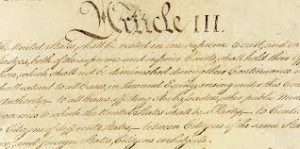 A magistrate judge ordered remand to state court in Davidson v. Georgia-Pacific. The Fifth Circuit concluded that because “a remand order is dispositive insofar as proceedings in the federal court are concerned,” it is “the functional equivalent of an order of dismissal.” Therefore, a magistrate judge could not make a final ruling on a motion to remand. In so holding, the Court “join[s] the uniform view of the courts of appeals that have considered this question[.]” No. 14-30925 (April 19, 2016).
A magistrate judge ordered remand to state court in Davidson v. Georgia-Pacific. The Fifth Circuit concluded that because “a remand order is dispositive insofar as proceedings in the federal court are concerned,” it is “the functional equivalent of an order of dismissal.” Therefore, a magistrate judge could not make a final ruling on a motion to remand. In so holding, the Court “join[s] the uniform view of the courts of appeals that have considered this question[.]” No. 14-30925 (April 19, 2016).
 In Burell v. Prudential Ins. Co., the Fifth Circuit addressed one of the many ERISA summary judgment cases in which it reviews a plan administrator’s work for abuse of discretion – or, in the somewhat cryptic language of ERISA: “our de novo review of [the] summary judgment ruling will also apply the abuse of discretion standard.” The panel affirmed over a dissent, which is not typical in such cases. It noted disagreement among the doctors who reviewed the claim, as well as allegations that the administrator did not follow its own review procedures, and would have found a fact issue for trial based on those matters. No. 15-50035 (April 11, 2016).
In Burell v. Prudential Ins. Co., the Fifth Circuit addressed one of the many ERISA summary judgment cases in which it reviews a plan administrator’s work for abuse of discretion – or, in the somewhat cryptic language of ERISA: “our de novo review of [the] summary judgment ruling will also apply the abuse of discretion standard.” The panel affirmed over a dissent, which is not typical in such cases. It noted disagreement among the doctors who reviewed the claim, as well as allegations that the administrator did not follow its own review procedures, and would have found a fact issue for trial based on those matters. No. 15-50035 (April 11, 2016).
 Yesterday’s “Above The Law” blog offers this entertaining exchange between a recent Fifth Circuit petition for rehearing — written in part as an imaginary exchange between lawyer and client about the rehearing process — and the Fifth Circuit’s response: rejection by the panel in a short opinion that was also written as an exchange of dialogue. (Thanks to 600Camp friend Cynthia Halatyn for sending along the link.)
Yesterday’s “Above The Law” blog offers this entertaining exchange between a recent Fifth Circuit petition for rehearing — written in part as an imaginary exchange between lawyer and client about the rehearing process — and the Fifth Circuit’s response: rejection by the panel in a short opinion that was also written as an exchange of dialogue. (Thanks to 600Camp friend Cynthia Halatyn for sending along the link.)
 In Banco Popular v. Kanning, a dispute over entitlement to life insurance proceeds produced two reminders about important, but not often-litigated, principles in business law. No. 15-50342 (Jan. 29, 2016, unpublished). First, an argument that a purported assignment required further actions to become effective failed when the document in question unambiguously said “hereby assign.” The opinion reviews other language in other cases that obscured the assignor’s intent. Second, insurance policy proceeds — while obviously monetary in nature — are sufficiently specific to support an action for conversion (applying Paschal v. Great Western Drilling, 215 S.W.3d 437 (Tex. App.–Eastland 2006, pet. denied)).
In Banco Popular v. Kanning, a dispute over entitlement to life insurance proceeds produced two reminders about important, but not often-litigated, principles in business law. No. 15-50342 (Jan. 29, 2016, unpublished). First, an argument that a purported assignment required further actions to become effective failed when the document in question unambiguously said “hereby assign.” The opinion reviews other language in other cases that obscured the assignor’s intent. Second, insurance policy proceeds — while obviously monetary in nature — are sufficiently specific to support an action for conversion (applying Paschal v. Great Western Drilling, 215 S.W.3d 437 (Tex. App.–Eastland 2006, pet. denied)).
Plan your New Orleans Mardi Gras trip with this calendar; the next parade is Saturday the 29th, featuring the Krewe of Cork.
The full Fifth Circuit has voted to rehear en banc the case of Flagg v. Stryker Corporation, a deceptively complicated dispute about the role of a pre-suit review process in determining how to consider a medical malpractice claim in the analysis of the parties’ citizenship.
 Underwood Cotton sued Clark Freight Lines, seeking a declaratory judgment about alleged overcharges on invoices for shipping containers. Clark removed the case on the basis of complete preemption, and counterclaimed for payment of the invoices. The district court dismissed the counterclaim and remanded, finding that federal jurisdiction had not been established over the declaratory judgment or the “converse breach of contract action” brought by Clark. The Fifth Circuit dismissed the resulting appeal, finding: “[T]he dismissal of the counterclaims did not precede the remand in logic and fact. Dismissing the counterclaims did not deprive the court of subject-matter jurisdiction; the district court ruled it never had jurisdiction to begin with.” Underwood Cotton Co. v. Clark Freight Lines, Inc., No. 14-11327 (Sept. 28, 2015, unpublished). The Court noted that the counterclaims could proceed in state court notwithstanding the district court’s jurisdictional ruling.
Underwood Cotton sued Clark Freight Lines, seeking a declaratory judgment about alleged overcharges on invoices for shipping containers. Clark removed the case on the basis of complete preemption, and counterclaimed for payment of the invoices. The district court dismissed the counterclaim and remanded, finding that federal jurisdiction had not been established over the declaratory judgment or the “converse breach of contract action” brought by Clark. The Fifth Circuit dismissed the resulting appeal, finding: “[T]he dismissal of the counterclaims did not precede the remand in logic and fact. Dismissing the counterclaims did not deprive the court of subject-matter jurisdiction; the district court ruled it never had jurisdiction to begin with.” Underwood Cotton Co. v. Clark Freight Lines, Inc., No. 14-11327 (Sept. 28, 2015, unpublished). The Court noted that the counterclaims could proceed in state court notwithstanding the district court’s jurisdictional ruling.
 The ABA Journal sponsors a “Blawg 100” list that recognizes legal blogs. Unlike the various top lawyer lists, the ABA encourages campaigning: (“Bloggers, by all means tell your readers about Blawg 100 Amici and invite them to send us messages on behalf of your blog.”) So if you enjoy 600Camp (or its sister blog, 600 Commerce about the Dallas Court of Appeals), please click here and fill out the ABA’s short form. Shouldn’t take but a minute, and much appreciated.
The ABA Journal sponsors a “Blawg 100” list that recognizes legal blogs. Unlike the various top lawyer lists, the ABA encourages campaigning: (“Bloggers, by all means tell your readers about Blawg 100 Amici and invite them to send us messages on behalf of your blog.”) So if you enjoy 600Camp (or its sister blog, 600 Commerce about the Dallas Court of Appeals), please click here and fill out the ABA’s short form. Shouldn’t take but a minute, and much appreciated.
 The Spongs bought property on Galveston Island and obtained flood insurance under the National Flood Insurance Program. Unfortunately, their property was located in an “coastal barrier resources system” area, ineligible for flood insurance; even more unfortunately, Hurricane Ike completely swept away everything on the property. The record showed confusion about the property address and the records kept by FEMA and the Fish and Wildlife Service. On an interlocutory appeal, the Fifth Circuit held that: (1) federal law did not preempt the Spongs’ claims related to “procurement,” as opposed to “claims handling,” but (2) “[i]n determining whether the property was within the CBRS and therefore eligible for a federal flood insurance policy, [the insurer] was acting as the representative of the Government, not the Spongs”; accordingly, the Spongs could not establish reasonable reliance. Spong v. Fidelity Nat’l Prop. & Cas. Ins. Co., No. 13-41317 (May 22, 2015).
The Spongs bought property on Galveston Island and obtained flood insurance under the National Flood Insurance Program. Unfortunately, their property was located in an “coastal barrier resources system” area, ineligible for flood insurance; even more unfortunately, Hurricane Ike completely swept away everything on the property. The record showed confusion about the property address and the records kept by FEMA and the Fish and Wildlife Service. On an interlocutory appeal, the Fifth Circuit held that: (1) federal law did not preempt the Spongs’ claims related to “procurement,” as opposed to “claims handling,” but (2) “[i]n determining whether the property was within the CBRS and therefore eligible for a federal flood insurance policy, [the insurer] was acting as the representative of the Government, not the Spongs”; accordingly, the Spongs could not establish reasonable reliance. Spong v. Fidelity Nat’l Prop. & Cas. Ins. Co., No. 13-41317 (May 22, 2015).
 Two principles – somewhat inconsistent – govern whether a court should accept an untimely request for jury trial. First, “‘because the seventh amendment confers a fundamental right,'” a court “typically ‘should grant a motion for jury trial . . . in the absence of strong and compelling reasons to the contrary.'” Second, “it is not an abuse of discretion to deny an untimely motion for a jury trial ‘when the failure to make a timely jury demand results form mere inadvertence on the part of the moving party.'” In BPRE, LP v. RML Waxahachie Dodge, LLC, under the operative scheduling order, the plaintiff had to make a request for a pretrial conference by January 31, 2010. It did not do so until February 16, and did not file a separate brief about the right to jury trial until April 12. The Fifth Circuit found no abuse of discretion in the trial court’s conclusion that this was “mere inadvertence,” and affirmed the finding of waiver. No. 14-50339 (April 7, 2015, unpublished).
Two principles – somewhat inconsistent – govern whether a court should accept an untimely request for jury trial. First, “‘because the seventh amendment confers a fundamental right,'” a court “typically ‘should grant a motion for jury trial . . . in the absence of strong and compelling reasons to the contrary.'” Second, “it is not an abuse of discretion to deny an untimely motion for a jury trial ‘when the failure to make a timely jury demand results form mere inadvertence on the part of the moving party.'” In BPRE, LP v. RML Waxahachie Dodge, LLC, under the operative scheduling order, the plaintiff had to make a request for a pretrial conference by January 31, 2010. It did not do so until February 16, and did not file a separate brief about the right to jury trial until April 12. The Fifth Circuit found no abuse of discretion in the trial court’s conclusion that this was “mere inadvertence,” and affirmed the finding of waiver. No. 14-50339 (April 7, 2015, unpublished).
 In a remarkably tangled construction dispute, the property owner interpleaded roughly $260,000, after a dispute arose between the general contractor and a sub. One of the interpleaded parties argued that the owner “faces only separate obligations,” augmented by the fact that the Mississippi statute relied upon the subcontractor to freeze the funds was declared unconstitutional. Auto Parts Manufacturing Mississippi, Inc. v. King Construction of Houston, No. 14-60217 (May 8, 2015). The Fifth Circuit disagreed: “The first stage of interpleader only is concerned with whether multiple claims have been asserted, or may be asserted, against a disinterested stakeholder, not whether those claims have merit.” The Court reminded that “interpleader jurisdiction is determined at the time the interpleader complaint is filed . . . ‘and subsequent events do not divest the court of jurisdiction once properly acquired.'”
In a remarkably tangled construction dispute, the property owner interpleaded roughly $260,000, after a dispute arose between the general contractor and a sub. One of the interpleaded parties argued that the owner “faces only separate obligations,” augmented by the fact that the Mississippi statute relied upon the subcontractor to freeze the funds was declared unconstitutional. Auto Parts Manufacturing Mississippi, Inc. v. King Construction of Houston, No. 14-60217 (May 8, 2015). The Fifth Circuit disagreed: “The first stage of interpleader only is concerned with whether multiple claims have been asserted, or may be asserted, against a disinterested stakeholder, not whether those claims have merit.” The Court reminded that “interpleader jurisdiction is determined at the time the interpleader complaint is filed . . . ‘and subsequent events do not divest the court of jurisdiction once properly acquired.'”
The plaintiffs have responded to the United States’ motion for a stay during the pendency of Texas v. United States, No. 15-40238, so that matter is now in the hands of the Court.
I am speaking to the Appellate Section of the Dallas Bar Association, at the Belo Mansion in downtown Dallas, at noon on Thursday March 19, with a Fifth Circuit update. The official title is “Horses, Whooping Cranes, and Eagle Feathers: the Fifth Circuit in 2014.” Here is a copy of the PowerPoint for the presentation.
I just wrote an article in the most recent Appellate Advocate – the publication of the Texas State Bar Appellate Section – about the key recent cases from the Fifth Circuit about jury charge error. I hope you enjoy it and find it useful in your practice!
In 2012, the Fifth Circuit remanded a False Claims Act case with the direction: “The district court should determine whether the public disclosures identified in the motion for summary judgment reveal either (i) that Shell was deducting gathering expenses prohibited by program regulations, or (ii) that this type of fraud was so pervasive in the industry that the company’s scheme, as alleged, would have been easily identified.” Little v. Shell Exploration, 690 F.3d 282 (5th Cir. 2012). On remand, the district court again granted summary judgment for the defense, and a displeased Fifth Circuit reversed. Little v. Shell Exploration II, No. 14-20156 (Feb. 23, 2015, unpublished).
The Court found: “Not only did the district court fail to follow these explicit instructions, but the analysis set out in its short opinion is so broad, conclusory, and unsupported by the summary judgment record that we are compelled to conclude it did not comply with our instructions.” On the merits, the Court held that “the district court erred with respect to every category of supposed public disclosures.” The Court went on to order reassignment to a different district judge on remand, concluding: ” Facing a lengthy and detailed summary judgment record, the district judge issued a five-page opinion with few
citations to either record evidence or relevant legal authority—not surprising given that neither the summary judgment evidence nor the law support the conclusions he reached.”
1. I am speaking at the Dallas Bar Appellate Section meeting on March 19 at the Belo Mansion, with an update on recent Fifth Circuit opinions of general interest.
2. This year’s Super Lawyers nomination deadline is Wednesday, February 18 (two days from now). Take a few minutes to support the publication and your colleagues; the nomination form is here.
- This contract language binds the parties to an agreed-upon postjudgment interest rate: “All past due interest and/or principal shall bear interest from maturity until paid, both before and after judgment, at the rate of 9% per annum.” The language “clearly, unambiguously, and unequivocally” refers to postjudgment interest.
- This language does not: “Invoices not paid within the stated terms will be charged 1.5% per month. . . . All freight, demurrage and other charges shall be subject to an interest charge of 1-1/2% per month beginning on the first day after the due date of invoice.”
Celtic Marine Corp. v. James C. Justice Co., No. 13-31306 (Nov. 20, 2014, unpublished) (quoting Hymel v. UNC, Inc., 994 F.2d 260 (5th Cir. 1993) (emphasis added)).
Leftover turkey? Have no fear — continue the celebration New Orleans style with Emeril Lagasse’s recipe for Turkey Bone Gumbo. Happy Thanksgiving from 600Camp!
 World Wrestling Entertainment sought ex parte seizure and temporary restraining orders, against unnamed defendants selling fake WWE merchandise at live events, under the Trademark Counterfeiting Act. The district judge denied relief, noting concerns about WWE’s ability to prove a likelihood of success against an unknown defendant. The Fifth Circuit (who reviewed the case because the district court certified the matter for interlocutory appeal) took a different view, noting: “WWE does not license third parties to sell merchandise at live events . . . The resulting confined universe of authorized sellers of WWE merchandise necessarily ‘identifies’ any non-WWE seller as a counterfeiter.” The opinion also observed that “the very nature of the ‘fly-by-night’
World Wrestling Entertainment sought ex parte seizure and temporary restraining orders, against unnamed defendants selling fake WWE merchandise at live events, under the Trademark Counterfeiting Act. The district judge denied relief, noting concerns about WWE’s ability to prove a likelihood of success against an unknown defendant. The Fifth Circuit (who reviewed the case because the district court certified the matter for interlocutory appeal) took a different view, noting: “WWE does not license third parties to sell merchandise at live events . . . The resulting confined universe of authorized sellers of WWE merchandise necessarily ‘identifies’ any non-WWE seller as a counterfeiter.” The opinion also observed that “the very nature of the ‘fly-by-night’  bootlegging industry” involves “counterfeiters who, upon detection and notice of suit, disappear without a trace and hide or destroy evidence, only to reappear later at the next WWE event down the road.” World Wrestling Entertainment, Inc. v. Unidentified Parties, No. 14-30489 (Nov. 4, 2014).
bootlegging industry” involves “counterfeiters who, upon detection and notice of suit, disappear without a trace and hide or destroy evidence, only to reappear later at the next WWE event down the road.” World Wrestling Entertainment, Inc. v. Unidentified Parties, No. 14-30489 (Nov. 4, 2014).
Four times in the last two months, 60 0Camp has won recognition from Texas Bar Today for a “Top 10 Post of the Week” among Texas law blogs, “based on subject matter, writing style, headline, and imagery.” The posts were The Regulation, My Friend, is Blowing in the Wind (Sept. 16), My Five Tips for Good Legal Writing (Oct. 9), Arbitration Here, There, or Nowhere (Oct. 20), and How to Notice Mississippi (Oct. 28). Thanks for your support!
0Camp has won recognition from Texas Bar Today for a “Top 10 Post of the Week” among Texas law blogs, “based on subject matter, writing style, headline, and imagery.” The posts were The Regulation, My Friend, is Blowing in the Wind (Sept. 16), My Five Tips for Good Legal Writing (Oct. 9), Arbitration Here, There, or Nowhere (Oct. 20), and How to Notice Mississippi (Oct. 28). Thanks for your support!
 While preparing a CLE for our associates, I drafted and posted my five tips for good legal writing, along with comments and examples. The tips are:
While preparing a CLE for our associates, I drafted and posted my five tips for good legal writing, along with comments and examples. The tips are:
- Avoid needless words.
- Use shorter words.
- Use shorter sentences.
- Avoid passive voice.
- There is no good writing. Only good re-writing.
I hope you have a chance to read the post, along with some of the linked examples, and that they are of use to you in your work.
The Fifth Circuit returned to the tension between excess and primary carriers in RSUI Indemnity Co. v. American States Ins. Co., a bad faith case under Louisiana law. After a review of the cases on the issue, the Court held “that under the circumstances of this case, where an excess carrier alleges that a primary insurer in bad faith breached its duty to defend a common insured properly and caused exposure of the insured to an increase in the settlement value of the case above the primary policy limit, which the excess insurer must then satisfy on the insured’s behalf, the excess insurer has a subrogated cause of action against the primary insurer for any payment above what it otherwise would have been required to pay.” No. 14-30033 (Sept. 25, 2014).
600Camp celebrates its birthday today, and as is its custom, proposes a New Orleans cocktail for the occasion. Please consider the “Touchdown Jesus Bloody Mary” as made by the Bourbon O bar in the French Quarter, one of the leading craft cocktail establishments in NOLA these days.
McAllen Grace Brethren Church v. Salazar presents a fascinating conflict between Native American religious practice and the preservation of endangered eagle species. No. 13-40326 (Aug. 20, 2014) Robert Soto, a member of the Lipan Apache Tribe, sought to use eagle feathers in a tribal religious ritual. All parties agreed that his beliefs were sincere and that the lack of the feathers would substantially burden his ministry. The Lipan Apaches, while recognized by Texas authorities since the 1838 Live Oak Treaty between the Tribe and the Republic of Texas, are not a “federally recognized tribe” as understood by the Interior Department. Accordingly, under the Department’s regulations that implement various statutes about the protection of eagles, he was not entitled to the feathers.
Assuming that the Department’s stated goals — eagle protection and protection of federally-recognized tribes — served compelling interests, the Fifth Circuit held that the record did not show that the regulations used the least-restrictive means to advance those interests. The Court found the Department’s evidence of harm to be inconclusive and subject to more than one interpretation, and also found inadequate consideration of potential alternative approaches. Acknowledging that other courts have accepted similar arguments by the Department, the Court observed: “Soto does not seek to make the practice of his religion ‘easier,’ he seeks to avoid roadblocks of the government’s own making which have made the practice of his religion not just ‘not easier’” but impossible.” Accordingly, it reversed a summary judgment for the Department and remanded.
A little-known but powerful part of Fed. R. Civ. P. 41(b) provides: “[I]f the plaintiff previously dismissed any federal- or state-court action based on or including the same claim, a notice of dismissal operates as an adjudication on the merits.” The Fifth Circuit affirmed a dismissal under this rule in Cabot Golf CL-PP 1, LLC v. Nixon Peabody, No. 13-40912 (July 7, 2014, unpublished). It began by noting that, in this context, the distinction between Rule 12 and Rule 56 was immaterial, where “the material facts are undisputed, and we address a pure question of law.” On the merits, Plaintiff had filed a state lawsuit, filed a federal lawsuit, dismissed the state action, and then dismissed the federal case with a unilateral notice. Plaintiff argued that the 2-dismissal rule “should apply only to serial litigation (i.e., suits which are filed after the earlier suits were dismissed), not to parallel/tandem litigation as in this case (i.e., suits which were already pending when the earlier suits were dismisssed).” The Court rejected that argument as unsupported by case law or the plain terms of the Rule.
A quick break to Texas law and Texas state court – the Dallas Morning News reports a great result for firm client Energy Transfer Partners, in what it calls “the largest civil judgment ever awarded by a state judge in Dallas”: Dallas Judge Awards ETP $500 Million.

